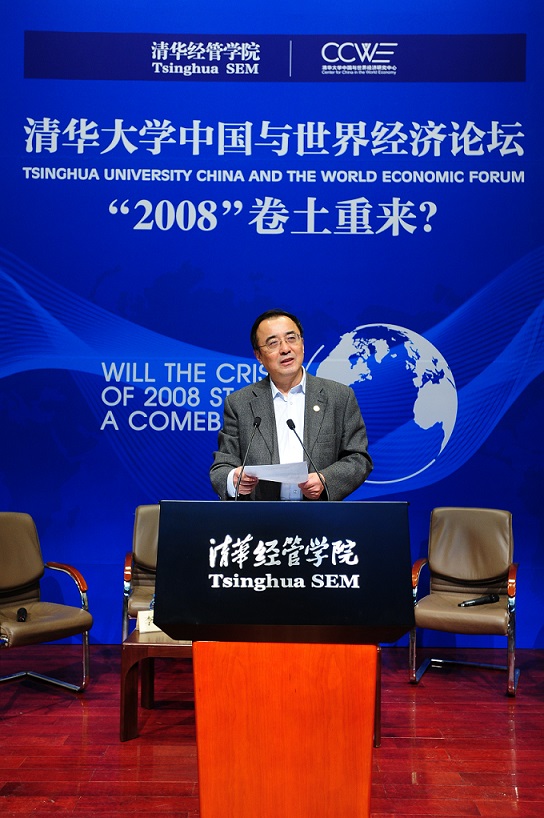No. 9 | Will the Crisis of 2008 Stage a Comeback?

On October 15, 2011, Tsinghua University Center for China in the World Economy (CCWE) held its ninth world economic forum, entitled, “Will the Crisis of 2008 Stage a Comeback?” The forum focused on the numerous challenges facing both the world and Chinese economies and the influence that these factors will have on China. Major issues addressed included the economic and political difficulties in the U.S.; the sovereign debt crises in EU countries; the slowdown of the economic growth rate in China; how to deal domestically with global financial crises; and the further paths for China’s future economic development. Professor David Daokui Li, Director of CCWE and Member of the State Monetary Policy Committee, served as the forum’s moderator.
Forum panelists included: ZHENG Xinli, Vice Chairman, CCIEE; YUAN Gangming, Senior Research Fellow, CCWE and the Chinese Academy of Social Sciences (CASS); WU Xiaoqiu, Director of the Institute for Finance and Securities Studies, Renmin University; LIU Jipeng, Professor, China University of Political Science and Law; Francis LUI, Chair, Department of Economics, HKUST; JIA Kang, Director of Research Institute for Fiscal Science, Ministry of Finance; FAN Jianping, Deputy Director, Department of Economic Forecasting, State Information Center; CHAI Qiang, Deputy Secretary General of the Real Estate Institute; Jose Luis Kaiser, Economic and Commercial Counselor, Spanish Embassy; Chew Ping, Managing Director & President, Greater China, Standard & Poor’s; and Michael Wines, China Bureau Chief, the New York Times.
The forum began with the international section featuring Jose Luis Kaiser, Chew Ping, Michael Wines and Francis Lui. Mr. Kaiser stated that while there are many difficulties in the euro zone working with so many countries, the debt levels as a share of GDP are much less than in the U.S. and Japan. He expressed the opinion that growth rate prospects are the main problem, and improving and reforming the labor market will require regaining the confidence of its citizens and the rest of the world. Mr. Wines said that the economic situation in the U.S. is due to three main problems: long-term debt; the current economic crisis; and a political crisis, which he believes is the most serious of the three. He articulated the view that the political system has never been as divided as it is now, as there is great division between those who want to cut spending and those who think the solution is stimulus. Mr. Chew explained S&P’s credit rating criteria for countries, which is determined by the national debt levels, the economic growth and the stability of policy. The reason S&P downgraded the credit rating in the U.S. was the concern over long-term ability to meet debt requirements, as doubts remain about the government’s ability to sustain and respond to another crisis. Professor Lui added that the imbalanced development of EU members is the key factor in explaining the Euro credit crisis. He is optimistic about the U.S., but pessimistic about the EU.
The forum then turned its attention to the domestic issues. There, the widely held view was that the current financial crisis will not hurt China as much as the crisis of 2008. On the one hand, the depth of today’s crisis is less severe than that of 2008. On another hand, China’s ratio of dependence on foreign trade has fallen, as ratio of surplus to GDP has gone from 8.9% in 2007 to 3.2% in 2010, showing that China’s economic structure has already made some adjustment. At the same time, China should not launch large fiscal spending to stimulate the economy because of the risk of hyperinflation and the limitation of the fiscal budget. China should take a long-term approach by adopting new development modes and methods through reformation in areas such as taxes, income distribution and the method of promoting government officials. At the same time,
The forum also featured the release of the most recent economic report produced jointly by CCWE and HKUST Center for Economic Development. The report analyzes and forecasts the Chinese economy for 2011 and beyond, covering GDP, CPI, M2 supply, import and export and fixed asset investment. The report predicts that
As a timely and effective platform, Tsinghua University will continue to invite extraordinary policy-makers, experts and business leaders – domestic and international – to address current and long-term Chinese domestic issues in relation to the international political and economic environment. The objectives of the forum are to brainstorm/inform and provide a solid basis for policy debate and recommendations.




